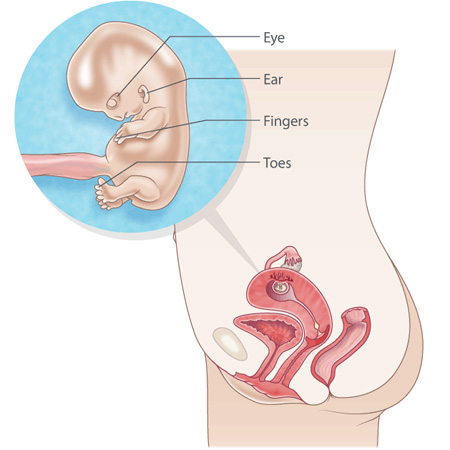
Pregnancy Week 10: A Journey of Growth and Transformation
Pregnancy week 10 marks a significant milestone in the remarkable journey of carrying a new life. As the first trimester draws to a close, the developing fetus undergoes rapid growth and transformation, while the mother’s body adapts to accommodate this extraordinary change.
Fetal Development: A Surge of Growth
By week 10, the embryo has officially transitioned into a fetus, a term that signifies a more advanced stage of development. The fetus is now approximately 1.2 inches (3 centimeters) in length and weighs about 0.1 ounces (3 grams).
During this week, the fetus’s facial features become more pronounced. The eyes, which were previously closed, begin to open, and the ears continue to develop. The limbs, which were previously stubby, start to lengthen and take on a more defined shape.
The fetus’s internal organs also undergo significant development. The heart, which began beating around week 4, is now fully formed and has four chambers. The liver and kidneys begin to function, and the digestive system starts to develop.
Maternal Changes: Adapting to Pregnancy
As the fetus grows, the mother’s body undergoes a series of changes to support the developing pregnancy. These changes include:
- Uterus Enlargement: The uterus, which was the size of a small fist at the beginning of pregnancy, has now expanded to about the size of a grapefruit. This expansion is necessary to accommodate the growing fetus.
- Breast Tenderness: The breasts begin to prepare for breastfeeding. They may become tender and swollen as the milk ducts develop.
- Morning Sickness: Morning sickness, a common symptom of early pregnancy, may continue or subside by week 10.
- Fatigue: Fatigue is another common symptom of pregnancy, as the body works hard to support the developing fetus.
- Frequent Urination: The increased blood flow to the kidneys leads to increased urine production, resulting in frequent urination.
Nutritional Needs: Fueling Growth
During pregnancy, it is essential for the mother to consume a healthy diet that provides adequate nutrients for both herself and the developing fetus. Some key nutrients to focus on include:
- Folic Acid: Folic acid is crucial for preventing neural tube defects in the fetus. It is recommended to consume 600 micrograms of folic acid daily.
- Iron: Iron is necessary for red blood cell production, which carries oxygen to the fetus. The recommended daily intake of iron during pregnancy is 27 milligrams.
- Calcium: Calcium is essential for bone development in the fetus. The recommended daily intake of calcium during pregnancy is 1,000 milligrams.
- Protein: Protein is necessary for the growth and repair of tissues in both the mother and the fetus. The recommended daily intake of protein during pregnancy is 71 grams.
Prenatal Care: Monitoring Progress
Prenatal care is essential for monitoring the health of both the mother and the fetus. During week 10, the mother may have her first prenatal appointment, which typically includes:
- Medical History: The doctor will ask about the mother’s medical history, including any previous pregnancies, illnesses, or surgeries.
- Physical Exam: The doctor will perform a physical exam to check the mother’s vital signs, weight, and abdominal size.
- Blood Tests: Blood tests may be ordered to check the mother’s blood count, hormone levels, and blood type.
- Ultrasound: An ultrasound may be performed to confirm the pregnancy, determine the gestational age, and check the fetus’s heartbeat and development.
Emotional and Psychological Changes
Pregnancy can be an emotionally and psychologically challenging time. Some common emotions experienced during week 10 include:
- Excitement and Joy: Many mothers feel a sense of excitement and joy as they realize the reality of their pregnancy.
- Anxiety and Uncertainty: It is also common to experience some anxiety and uncertainty about the future, especially for first-time mothers.
- Mood Swings: Pregnancy hormones can lead to mood swings, which can range from elation to sadness.
Tips for Week 10
- Continue to take prenatal vitamins and eat a healthy diet.
- Get regular exercise, but avoid strenuous activities.
- Listen to your body and rest when you need to.
- Talk to your doctor about any concerns or questions you have.
- Connect with other pregnant women through support groups or online forums.
Conclusion
Pregnancy week 10 is a time of significant growth and transformation for both the fetus and the mother. The fetus undergoes rapid physical development, while the mother’s body adapts to support the pregnancy. By understanding the changes that occur during this week, mothers can navigate this journey with confidence and prepare for the exciting months ahead.